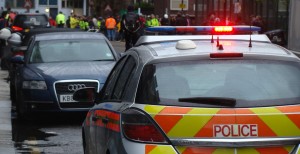On November 15th voters across England and Wales (except in London) will be able to vote for their Police Commissioner for the very first time. Police Commissioners are an alternative to Police Authorities and so replacing political appointment of, among others, County Councillors with direct elections.
 The elections will be conducted with a first and second preference voting system just like the Mayoral elections, which is nice. However, when I noticed that of the fifteen Bristol Mayoral candidates (taking place on the same day) just one of them was a woman, I wondered whether women were better represented among the Police Commissioner candidates… with predictable results.
The elections will be conducted with a first and second preference voting system just like the Mayoral elections, which is nice. However, when I noticed that of the fifteen Bristol Mayoral candidates (taking place on the same day) just one of them was a woman, I wondered whether women were better represented among the Police Commissioner candidates… with predictable results.
The headline figures
There are 41 elections taking place in total, with 192 candidates.
15 of these elections have no women standing – at all. That’s 37% of the country that can vote for a police commissioner has no woman candidate to vote for. There is one seat, North Yorkshire where all the candidates are women. Yes, both of them.
There are 41 female candidates, which is 21.4% of the total. In other words there are just under four times as many male candidates as female.
Labour are the best party at fielding women as candidates with 34% of their candidates being female (14 of them).
The Conservatives are fielding 6 women, The Lib Dems 4 and UKIP 3.
Independents are fielding 8 women of 52 unaffiliated candidates (15.4%).
It’s not good enough really is it?
Anyway, here’s the list;
England:
Avon and Somerset Constabulary: 4 candidates, 1 woman (the only independent candidate)
Bedfordshire Police: 5 candidates, 1 woman (the Lib Dem)
Cambridgeshire Constabulary: 7 candidates, no women.
Cheshire Constabulary: 5 candidates, 2 women (UKIP and independent)
Cleveland Police: 4 candidates, no women.
Cumbria Constabulary: 4 candidates, 2 women (Lib Dem and independent)
Derbyshire Constabulary: 4 candidates, no women.
Devon and Cornwall Police: 10 candidates, 2 women (Labour and independent)
Dorset Police: 4 candidates, one woman (Labour)
Durham Constabulary: 4 candidates, no women.
Essex Police: 6 candidates, 2 women (Labour and independent)
Gloucestershire Constabulary: 4 candidates, 2 women (Labour and Conservative)
Greater Manchester Police: 5 candidates, no women.
Hampshire Constabulary: 6 candidates, one woman Labour).
Hertfordshire Constabulary: 4 candidates, 2 women (Labour and UKIP)
Humberside Police: 7 candidates, 1 woman (Lib Dem)
Kent Police: 6 candidates, 2 women (Labour and independent)
Lancashire Constabulary: 4 candidates, no women
Leicestershire Constabulary: 3 candidates, 1 woman (Labour)
Lincolnshire Police: 4 candidates, no women
Merseyside Police: 6 candidates, 3 women (UKIP, Lib Dem, Labour)
Norfolk Constabulary: 5 candidates, no women
North Yorkshire Police: 2 candidates, 2 women! (Labour and Tory)
Northamptonshire Constabulary: 5 candidates, no women.
Northumbria Police: 4 candidates, 1 woman (Labour)*.
Nottinghamshire Police: 4 candidates, no women.
South Yorkshire Police: 5 candidates, no women.
Staffordshire Police: 2 candidates, one woman (Labour).
Suffolk Constabulary: 4 candidates, one woman (Labour).
Surrey Police: 6 candidates, one woman (Tory).
Sussex Police: 5 candidates, one woman (Tory).
Thames Valley Police: 6 candidates, one woman (independent).
Warwickshire Police: 3 candidates, no women.
West Mercia Police: 3 candidates, no women.
West Midlands Police: 7 candidates, one woman (independent).
West Yorkshire Police: 4 candidates, one woman (Tory).
Wiltshire Police: 6 candidates, one woman (Labour).
Wales:
Dyfed-Powys Police: 2 candidates, one woman (Labour).
Gwent Police, 4 candidates, no women.
North Wales Police: 5 candidates, no women.
South Wales Police: 4 candidates, one woman (Conservative).
* I managed to mistranscribe this one missing out the fact that Labour’s candidate, Vera Baird, is indeed a woman. Apologies – I’ve corrected the figures in the headlines above.
